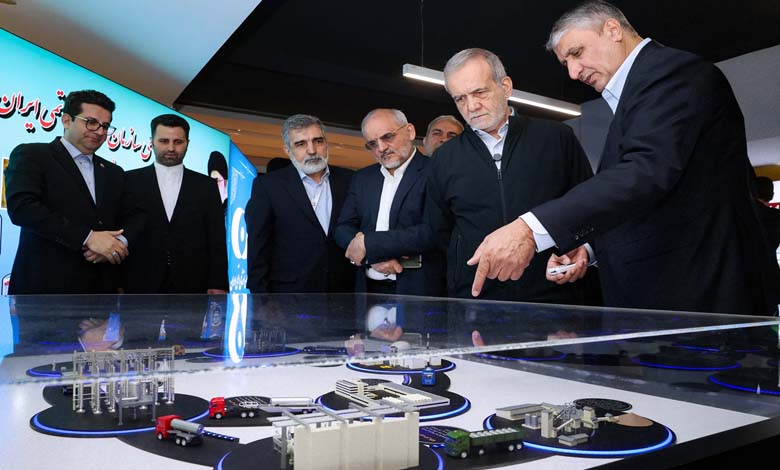Washington Charts a New Course for Nuclear Negotiations with Tehran by Sidelining Europeans

Washington’s decision not to coordinate with European countries on upcoming negotiations with Iran could diminish their influence in the discussions and ultimately increase the likelihood of joint U.S. and Israeli military action against Tehran.
European diplomats indicated that the U.S. did not inform its European allies about the nuclear talks in Oman before President Donald Trump announced them, despite the possibility of reimposing UN sanctions on Iran.
-
Khamenei, Iran’s Illness and the Obstacle to Any Agreement with Washington
-
Washington Tests Military Capabilities Amid Escalation Between Israel and Iran
Blaise Mischtal, vice president of policy at the Jewish Institute for National Security of America, emphasized the need for a coordinated diplomatic strategy with European allies to ensure maximum pressure and give diplomacy a chance to succeed, stating that such coordination is “essential to ensure maximum pressure and to give any diplomatic option a chance of success.”
Trump, who resumed his “maximum pressure” campaign against Tehran in February, reiterated on Wednesday his threats to use military force against Iran if it does not halt its nuclear program, stating that Israel “would lead” such action.
Following Washington’s withdrawal from the 2015 nuclear agreement with Iran, the U.S. can no longer activate the UN Security Council’s snapback sanctions mechanism on its own.
-
Washington rules out Iran and its proxies’ involvement in expanding the war
-
Washington sends messages to Iran and Hezbollah via Turkey… Details
Analysts note that this leaves the United Kingdom, Germany, and France—collectively known as the European troika—as the only participants in the deal with both the authority and willingness to seek the reimposition of sanctions. They also highlight the importance of Washington maintaining its alliance with these nations. Israel, Iran’s arch-enemy, has already pressured the three European countries to initiate the process.
According to three European diplomats, the troika has informed Iran that it plans to activate the snapback sanctions mechanism by the end of June. Iran responded by warning of severe consequences and a review of its nuclear doctrine.
A senior European diplomat remarked, “The E3 no longer trusts the United States because Washington is taking initiatives without consulting them.”
-
Washington Imposes New Sanctions on Iranian Individuals and Entities… What’s New?
-
Washington doubts the seriousness of forming a naval alliance comprising Iran and Gulf states
Iranian Foreign Ministry spokesperson Esmail Baghaei stated in a post on X (formerly Twitter) on Friday that Tehran is giving the scheduled talks with the U.S. a “real chance,” adding, “We intend to assess the other side’s intentions and make a final decision on Saturday.”
Under the 2015 accord, there is a mechanism known as “snapback” that allows for the reimposition of UN sanctions on Iran if any participant states accuse Tehran of significant non-compliance and disputes remain unresolved.
Once the snapback process is triggered, the Security Council must vote within 30 days on a resolution to continue lifting sanctions. This requires nine votes in favor and no veto from the U.S., Russia, China, the UK, or France.
-
Between Escalation and De-escalation: How Will Trump Handle Iran?
-
From Natanz to Arak: Iran’s Key Nuclear Facilities
If the resolution fails, all previously lifted UN sanctions on Iran would be reinstated unless the Council agrees on another course of action.
Although Trump withdrew from the nuclear deal, in August 2020, the U.S. claimed it had initiated the snapback process, arguing that it was still recognized as a participant under the 2015 resolution.
However, all other parties to the agreement—including Iran, Germany, France, the UK, Russia, and China—told the Security Council they did not recognize the U.S. move. Most Council members rejected it, and the reimposition of sanctions was not officially recognized.
-
Tehran Ready for Indirect Talks with Washington in Response to Trump’s Letter
-
Iran Reshuffles Its Proxies in Yemen and Iraq amid U.S. Strikes
All other participants have the legal ability to trigger the snapback process, but in reality, only Germany, France, and the UK appear willing to do so.
When the 2015 UN resolution expires on October 18, the opportunity to activate the snapback mechanism will also expire. Trump has instructed his ambassador to the UN to work with allies on reinstating sanctions against Iran.
The UK, France, and Germany have informed the Security Council of their readiness to proceed with the reimposition of sanctions and are pushing for a “comprehensive” report from the International Atomic Energy Agency (IAEA) on Iran’s nuclear activities, which could further support their case.
-
Trump Gives Iran Two Months to Negotiate a New Nuclear Deal
-
Iran intercepts U.S. spy plane amid continued state of maximum alert
The deal’s participants are first required to use the dispute resolution mechanism, launched by the UK, France, and Germany in January 2020—a process that Russia opposes.
The E3 will likely take into account that Russia will assume the presidency of the Security Council in September when planning their strategy for pursuing sanctions.
If snapback sanctions are triggered, all measures previously imposed on Iran by six UN Security Council resolutions between 2006 and 2010 would be reinstated.
-
Are the UAE Playing a Mediation Role Between Iran and the United States?
-
U.S. Report: Israel to Launch an Attack on Iranian Nuclear Sites by Mid-Year
These include bans on arms sales, as well as prohibitions on uranium enrichment and reprocessing.
Additional measures include bans on ballistic missile launches and related activities involving missiles capable of carrying nuclear warheads, along with restrictions on the transfer of missile-related technology and technical assistance.
The sanctions would also entail targeted global asset freezes and travel bans on designated Iranian individuals and entities.
Moreover, countries would be permitted to inspect shipments from Iran Air Cargo and the Islamic Republic of Iran Shipping Lines for prohibited goods.












